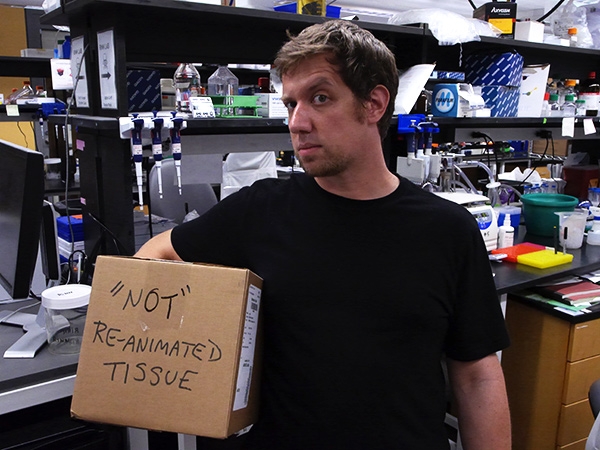The summer is winding to an end, and Matrix is catching up with David Shechner, Postdoctoral Fellow in the Rinn Lab at Harvard’s Department of Stem Cell and Regenerative Biology (SCRB). He gave Matrix an earful about his unpronounceable research, his seemingly contradictorily masterful language skills, and why we might fear his chemistry skills if we were living in an alternate universe.

Matrix: So David, what do you do?
David: Are you sure you want the answer to that? Haven’t you heard the joke that if you’ve got six hours to kill, you should ask a scientist about his experiment?
Matrix: Oh dear. Tell me anyway.
David: Well, I work on non-coding RNAs and epigenetics, and I’m mostly in technology development – building new tools to help us study and manipulate RNAs. Our group just published a paper where we talked about CRISPR-Display, or “CRISP-Disp” that we designed. What it lets you do is pick up non-coding RNAs or domains and selectively target them to different loci in the genome per your design. It’s like a molecular postman, and you can make these parcels with it and send them anywhere you want. Our paper was called “Multiplexable, locus-specific targeting of long RNAs with CRISPR-Display.” But of course within two hours of the paper going live I got a text from a friend of mine saying “CRISP-Disp is utterly unpronounceable, well done!”
Matrix: Well I think it’s a nice tongue twister – just say it 5 times fast and you can improve your enunciation skills! Now I have to ask, (because this is a question that I’m rather fond of now) - when you’re not coming up with whacky names for technology, do you watch Game of Thrones? I know the season has ended, but I’m in withdrawal. So humor me by telling me who you’d be if that universe was our reality.
David: It’s probably trite for me to say that I’d be a Pyromancer, but I’m going to go with that, because they’re the chemists of Westeros. I’d be developing wildfire I’m sure. [Wildfire, readers, is a flammable material which has a green hue, cannot be extinguished by water, and is often used as a powerful weapon in battle.] Because clearly all those folks are driven a little insane by their time as Pyromancers, and I feel like that’s a fairly accurate depiction of being a professional scientist! Disclaimer though: if there happens to be a fire in the lab that is not my fault and I am not involved - I’m just going to go ahead and say that right now!
Matrix: Duly noted! Alright Mr. Pyromancer, where are you from originally?
David: I’m from Long Island, New York. And it’s a funny story actually why I don’t have the accent. For 8 years when I was a kid I went to this wonderful performing arts camp in the Adirondacks in upper-state NY. One of the teachers in particular there took an interest in my acting talent. When I was eight I read for a part and his response was, “Well you read very well for an eight-year-old, but my God your accent!” He basically put me into a sort of all-summer training to get rid of my accent, and it worked – but I lost it permanently and when I came home my parents freaked out that it was gone! And only if I really concentrate can I slip back into it again now... Yes it was a critical time in my life, and very à la My Fair Lady!
Matrix: So essentially, you can speak American English and Long-Islander. Know any other languages?
David: I’m decent in Turkish. I took five semesters of it here at Harvard: 9:00 a.m. every morning, intensive Turkish! My wife was born and raised in Turkey, so I was highly motivated to learn it – though now I joke that I learned Turkish for the most important woman in my life, and that’s my mother-in-law. Turkish is so unrelated to other languages, though if you’re a linguist you can see that there are some structural resemblances to Mongolian and Korean. But my favorite thing about Turkish is this structure they have in place where you can add extra suffixes to everything. Most of the language is built on this – so there’s no single longest Turkish word because you can just keep on adding to them. There’s an unofficial national pastime where you try to create the longest word that still has a parsable meaning to it.
Matrix: Sounds like more tongue twisters! Can you teach us some Turkish phrases that might be particularly useful here at SCRB?
David: Well, some short phrases that we might use the most here would be, “ben kahve istiyorum,” or “I want coffee,” and “ücretsiz tatlı var mı?” which translates to, “are there free sweets?”
Matrix: Ah yes, I encounter those phrases (in English) a lot at SCRB, particularly in the Common Room at snack hour every day! Okay readers, get to work – I want to hear about your nutritional needs in Turkish from now on!
